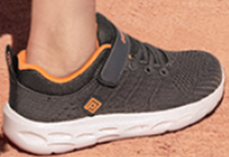Contact Our Dispute Resolution Team
If you need the help of a professional intellectual property or dispute resolution lawyer, please contact Myerson Solicitors on:
The legal saga surrounding Umbro's iconic "double diamond" logo took a decisive turn recently.
The Court of Appeal overturned the High Court's ruling and found that the Umbro brand was in favour, holding that Dream Pairs' logo infringed upon the Umbro trademark.
This case serves as a valuable reminder for businesses of the importance of protecting their intellectual property and the factors courts consider in trademark infringement claims.
Umbro, a renowned sportswear brand owned by Iconix Luxembourg Holdings SARL ("Iconix"), has enjoyed longstanding recognition in the UK since 1973 for its "double diamond" logo.
This mark is registered for various goods, including sports footwear.
Umbro's trade mark:

Dream Pairs, a footwear retailer founded in 2009 in the US and trading in the UK since 2019, used a logo featuring a tilted square design on its shoes.
Umbro argued that Dream Pairs' logo was deceptively similar to its double diamond, causing a likelihood of confusion among consumers and potentially damaging Umbro's brand reputation.
Dream Pairs' sign:

The High Court dismissed Iconix's claim.
The judge focused on static images of the logos and footwear presented in Dream Pairs' online listings.
He concluded that the visual similarities were "very faint" and insufficient to create confusion.
While acknowledging Umbro's strong brand recognition, the judge deemed it not enough to overcome the perceived minimal visual resemblance.
Iconix appealed the decision, and the Court of Appeal reached a contrasting conclusion.
Lord Justice Arnold, delivering the leading judgment, disagreed with High Court's approach.
Firstly, the focus on isolated, static images wasn't reflective of real-world situations.
Consumers encounter logos on footwear from various angles, not just perfectly head-on, as presented in online listings.
When viewed from different perspectives, the Court found a clear visual similarity between the two logos, with Dream Pairs' design potentially appearing as a distorted version of Umbro's double diamond.

Secondly, the Court emphasised the importance of considering the relevant public, the average consumer in this case.
While online listings might offer clear views of logos, consumers are more likely to see them on footwear in motion, on store shelves, or even on another person's feet.
The Court highlighted that a quick glance at footwear from various angles could lead to confusion, especially considering Umbro's established brand dominance.
The Court of Appeal's decision hinged on the concept of "post-sale confusion."
This refers to the possibility of consumers being misled after purchasing Dream Pairs' footwear.
Imagine a customer buying Dream Pairs shoes, mistaking them for a budget version of Umbro's brand due to the logo's similarity.
This potential for confusion after the sale tipped the scales in Iconix's favour.
The Iconix v Dream Pairs case offers valuable takeaways for businesses of all sizes:
The Court of Appeal's decision serves as a victory for the Umbro brand and a reminder of the importance of protecting trademarks.
Businesses must vigilantly safeguard their intellectual property and be mindful of potential similarities with competitor logos, especially when considering real-world consumer experiences.
By understanding the factors courts consider in trademark disputes, businesses can make informed decisions and minimise the risk of infringement.
If you need the help of a professional intellectual property or dispute resolution lawyer, please contact Myerson Solicitors on: